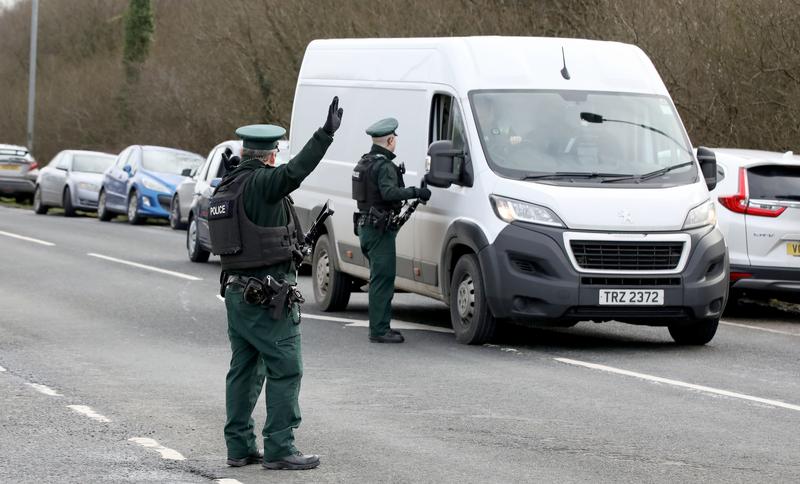 Armed police officers speak to passing drivers near the scene of a shooting of an off duty policeman at the Killyclogher Road sports complex in the northern Irish town of Omagh on February 23, 2023. (PHOTO / AFP)
Armed police officers speak to passing drivers near the scene of a shooting of an off duty policeman at the Killyclogher Road sports complex in the northern Irish town of Omagh on February 23, 2023. (PHOTO / AFP)
LONDON - Britain's MI5 intelligence agency has increased the threat level in Northern Ireland from domestic terrorism to "severe" - meaning an attack is highly likely.
The move to return the level to its second highest category follows recent attacks on police offices and comes weeks before political leaders are due to gather in the province to celebrate the 25th anniversary of a peace deal that largely ended three decades of violence.
US President Joe Biden said this month that he had accepted an invitation to visit Northern Ireland in April, and both Bill and Hillary Clinton are due to attend anniversary-related events
US President Joe Biden said this month that he had accepted an invitation to visit Northern Ireland in April, and both Bill and Hillary Clinton are due to attend anniversary-related events.
"The public should remain vigilant, but not be alarmed, and continue to report any concerns they have," Chris Heaton-Harris, the British minister for the province, said in a written statement.
ALSO READ: Muted opposition: UK PM wins N. Ireland vote in parliament
The British government said the level had been increased from "substantial" following the recent targeting of police officers, and it was not thought to be linked to the anniversary.
The threat for Northern Ireland had been held at severe since the system was introduced in 2010. It was lowered, for just over a year, in 2022.
Chief Constable Simon Byrne of the Police Service of Northern Ireland said his officers would not be deterred from "delivering a visible, accessible and responsive community focused policing service to keep people safe".
While a 1998 peace deal largely ended three decades of sectarian violence in Northern Ireland, police officers are still sporadically targeted by small splinter groups of mostly nationalist militants opposed to Britain's rule over the region.
An off-duty officer was left seriously injured last month following a gun attack that police said was carried out by the new IRA, a much smaller group than the Irish Republican Army, which disarmed following the Good Friday accord.
READ MORE: Irish PM urges UK to support peace, stability in N. Ireland
Detective Chief Inspector John Caldwell was shot a number of times by two gunmen while putting footballs in his car after finishing a coaching session with a youth soccer team.
Some 3,600 people died during the fighting between Irish nationalist militants seeking union with the rest of Ireland, and the British army and pro-British unionist militants wanting to stay in the United Kingdom.
Leaders are due to gather in Belfast in April to celebrate the signing of that peace deal, which was struck on April 10, 1998, and partially brokered by the US government of then-President Bill Clinton.


